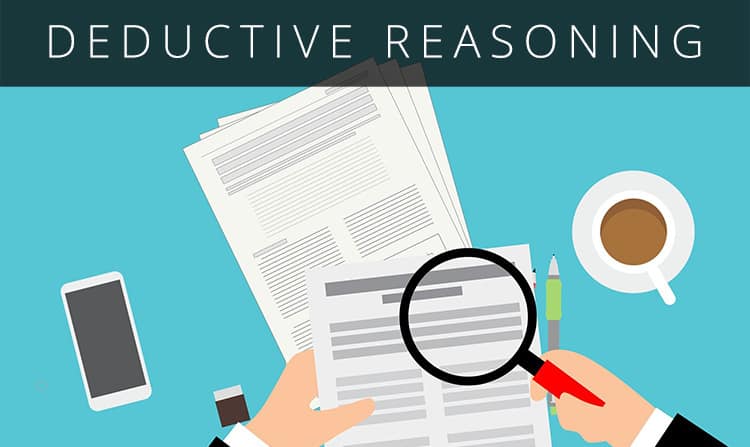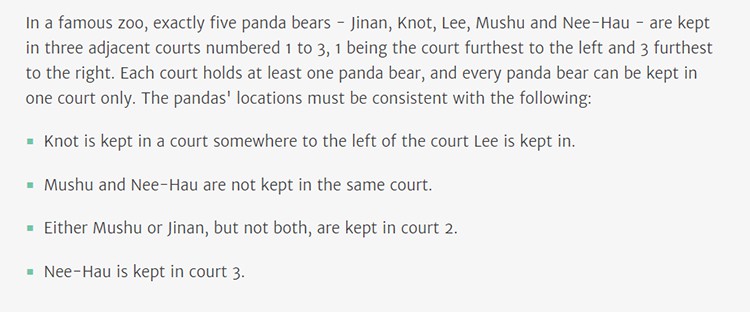Deductive Reasoning Test Guide: 3 Key Steps to Ace the Test
Many graduates and job seekers will face a deductive reasoning test in recruitment for a new role. If that’s you, then you’re in the right place. While these tests can be daunting, you can overcome any nerves with the right preparation.
Keep reading for everything you need to pass your upcoming deductive reasoning test and show you’re the best candidate for the job.
In this free deductive reasoning test guide we will show you:
- 3 quick and easy ways to pass a deductive reasoning test
- Deductive reasoning practice questions and answers
- 3 of the most common test question types
You can find some of the best tailored deductive reasoning practice tests here.
What is a deductive reasoning test?
These psychometric tests measure your ability to process information and draw logical conclusions. You’ll need to use the art of deduction to decide whether a certain conclusion is valid based on given statements.
Deductive reasoning is a useful skill in the workplace because it makes you a better problem solver and critical thinker.
You’d be able to use the knowledge and information that’s available to you to find proactive solutions and make sound decisions that benefit the company.
Because of that, employers will commonly use deductive reasoning tests to help them find candidates for roles that require you to work logically and methodically, such as in IT, science and engineering.
Deductive reasoning vs inductive reasoning tests: How do they differ?
Deductive reasoning tests will sometimes go hand in hand with inductive reasoning tests.
These both fall under the broader category of logical reasoning tests, and depending on the employer and the role you’re applying for, you may be asked to take:
- A deductive reasoning test only,
- Both a deductive reasoning test and an inductive reasoning test, or
- A deductive reasoning test together with other logical reasoning tests. Check out our comprehensive logical reasoning test guide to learn more about the types of tests that could be covered.
Deductive reasoning and inductive reasoning tests are very different, so it’s important to prepare for them both separately.
In technical terms, deductive reasoning starts with a general statement to reach a specific, logical conclusion. Inductive reasoning, on the other hand, starts with specific information to reach a more general (but still logical) conclusion.
So, a deductive reasoning test will give you a set of general statements and ask you to come to a specific conclusion about them.
An inductive reasoning test will give you a set of specific patterns and ask you to come to a general conclusion about them. To see this in practice, head over to our inductive reasoning test guide for more detailed examples and explanations.
What to expect in a deductive reasoning test
When you take your deductive reasoning test, you’ll have a set time limit to answer a number of online multiple-choice questions.
The exact time limit and number of questions will depend on which test provider the employer uses, but on average, you can expect to have about 25-30 seconds per question.
There are a few different types of questions you could be asked, but in general, they follow a pretty similar format:
You’ll get a short paragraph of information, followed by a series of statements based on the information. You then need to decide which statement follows logically from that information.
The most common question types include:
- Syllogisms – where you draw a conclusion from two or more given statements.
- Arrangements – where you arrange a list of items according to a set of given rules.
- Underlying Assumptions – where you identify the most logical assumptions underlying a given argument.
Deductive reasoning example questions
To give you a clearer idea of what to expect, let’s look at some actual examples of deductive reasoning test questions from JobTestPrep.
Question 1
First up, here’s a syllogism:
Which statement must be true?
A. There is not one slim person that isn’t a dancer.
B. All singers are slim.
C. Any slim person is also a singer.
D. All dancers are slim singers.
E. None of the above.
ANSWER
All the other statements are false or can’t be determined with the information you’re given.
The negative phrasing of this question makes it confusing when you first look at it, but you just need to break down the groups individually (singers, dancers, slim people) and identify the relationships between them (every singer is a dancer, every dancer is slim).
Question 2
Now try your hand at an arrangement:
Which statement cannot be true?
A. One bear is kept in court 2.
B. Two bears are kept in court 1.
C. Two bears are kept in court 2.
D. Three bears are kept in court 3.
E. Three bears are kept in court 2.
ANSWER
It’s the only statement that cannot possibly be true, while all the other statements are possible.
Use a process of elimination to determine which arrangement of bears is possible. Note that the correct answer is the one that’s not possible.
How to pass deductive reasoning tests: 3 pro tips
#1: Know your test provider
The structure and format of deductive reasoning tests varies between test providers, so make sure you find out beforehand who’s supplying your test.
The two most common are CEB SHL and IBM Kenexa.
- The CEB SHL deductive reasoning test is 20 questions in 10 minutes. It can include syllogism, arrangement and underlying argument questions.
- IBM Kenexa’s deductive reasoning test is usually 20 arrangement questions in no set time limit, but your total time is still factored into your score. The format can change depending on the role you’re applying for.
#2: Take the right deductive reasoning practice tests
Taking practice tests is the best way to improve your skills, confidence and speed – but don’t waste your valuable prep time with general aptitude tests.
Go for specifically-designed deductive reasoning practice tests that replicate the format and timing of the actual test you’ll be taking on the day.
Once you know who your test provider is, focus your attention on preparing for only that type of test. You can find deductive reasoning practice tests for both CEB SHL and IBM Kenexa to help you familiarise yourself with what to expect.
#3: Practice different solving strategies
When you’re faced with a tricky question, it can be helpful to use some of these techniques to help you find the answer:
- Keep scrap paper handy to rewrite, break down and rearrange the information in the question. This will help you visualise it more clearly, especially in the case of syllogism and arrangement questions.
- Identify what information is relevant and what’s not. Many deductive reasoning test questions seem more complicated than they are because of extraneous information. Read the question carefully and highlight or mark what’s important.
- Take note of key words. Words like “all”, “most”, “some”, “never” and “none” can change the whole meaning of a statement, so pay particular attention to them.
Good luck, you can do this!
Some more guides to help you succeed…
- Numerical Reasoning: Numerical Reasoning Test Guide: 5 Proven Tips to Succeed
- Verbal Reasoning: Verbal Reasoning Test: What You Need to Know to Pass
- UKCAT: UKCAT Test Guide: 4 Secrets to UKCAT Success 2020
- Watson-Glaser: Watson-Glaser Test: Everything You Need to Know to Pass
- Mechanical Comprehension: Mechanical Comprehension Test Guide 2020







